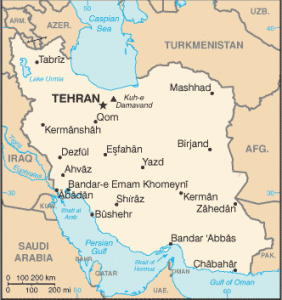The international sanctions regime placed on Iran has cut the country’s oil exports almost in half, as the US and its allies develop a harder line after several rounds of nuclear negotiations.
 In 2011, Iran was exporting an average of 2.2 million barrels of oil per day. Under additional US-led economic sanctions, Iran’s exports declined to about half that in June, to about 1.2 million barrels per day and is expected to be even worse for July.
In 2011, Iran was exporting an average of 2.2 million barrels of oil per day. Under additional US-led economic sanctions, Iran’s exports declined to about half that in June, to about 1.2 million barrels per day and is expected to be even worse for July.
July’s deficit translates into a loss of about $3.4 billion in monthly government revenue compared to a year ago, a devastating loss for a country with rampant consumers price inflation and mounting unemployment.
Other oil producing states in the Middle East with dictatorships obedient to US rule, like Saudi Arabia, have been increasing supply so as to avoid rising global oil prices due to the sanctions on Iran.
The supposed justification behind all of this is to pressure the Iranian government to give up its alleged ambitions to obtain nuclear weapons. But the consensus within the US intelligence community and indeed the Obama administration itself is that Iran has no nuclear weapons program and has demonstrated no intention to start one.
The sanctions are really about placating Israel’s trumped-up concerns and trying to stoke internal discontent and pressure Tehran into making absurd concessions in international negotiations over their civilian nuclear program.
Writing in Foreign Affairs, celebrated international relations academic Kenneth Waltz argued that sanctions “primarily harm ordinary Iranians, with little purpose.”
A recent piece in Foreign Policy argued similarly that the people, not the regime, will be hurt by this economic warfare. The decreased oil revenues “will stay firmly in the hands of the hardliners and the repressive organs of the state. Meanwhile, youth unemployment — which already exceeds 70 percent — will rise higher, and the quality of life of the underprivileged and retirees reliant on government handouts for their meager existence will decline further.”


